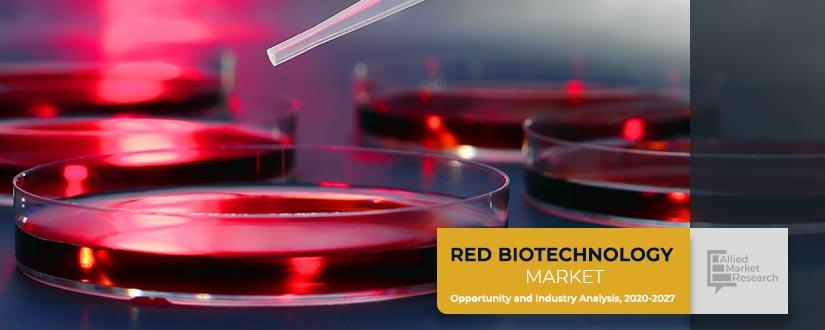The process of red biotechnology makes use of various organisms for the betterment of healthcare and to build immunity against diseases. This modern branch of biotechnology has been used for the medical field. This has been of great use not only in pharmaceutical as well as the medical industry and has helped to enhance the lifestyle quality along with reducing the suffering of humans. Furthermore, red biotechnology has been utilized in various fields such as gene therapy, diagnostics, clinical trials, and research. Product development and genetic engineering pertaining to new medicines for the treatment of life-threatening diseases is the major advantage of red biotechnology. The red biotechnology process is used in various technologies for combined vaccine production such as DPT, merged with Hepatitis A, Hepatitis B, and polio vaccine. It is also used in poultry farming & veterinary science, cancer research, tissue engineering, and many other fields. In addition, artificial bones, skins, spinal discs, and cartilages are produced by the use of tissue engineering; similarly, tissue implantation can be done by using tissue engineering too.
COVID-19 scenario analysis:
- Pharmaceutical and biotech companies together with governments around the globe are working to address the COVID-19 outbreak, from supporting the development of vaccines to planning for medicines supply chain challenges.
- Currently, around 115 vaccine candidates and 155 molecules are in the R&D pipeline. Moreover, commonly used drugs, such as hydroxychloroquine, have witnessed a dramatic surge in demand for the management of COVID-19. Such high demand for these drugs has presented huge opportunities for manufacturers of COVID-19 management drugs as many developed countries are short of these drugs.
- The pharmaceutical and biotechnology industries are expected to witness a significant growth in the future, owing to the demand for vaccine and treatment drugs for COVID-19.
- Attributed to such factors, COVID 19 is expected to have a significant impact on the red biotechnology market.
Top impacting factors: Market scenario analysis, trends, drivers and impact analysis
There are upgrades in biotechnological fields to manufacture new therapeutic drugs for sophisticatedly fighting diseases; significant rise in advancement rate in stem cell research fields to manufacture new and personalized methods; and genetic engineering enables correcting the genetic composition of patients. These are the major factors propelling the growth of the red biotechnology market. Along with this, there has been significant rise in the frequency of chronic diseases; constantly growing biopharmaceutical industries; and rise in investments of the healthcare industry, which propel the market. Additionally, spreading awareness for the treatment of chronic diseases, increase in number of clinical trials for the development of drugs, and rise in acceptance and demand for biosimilars affect the growth of the red biotechnology market positively.
On the other hand, the rise in failure rate of various drugs in the later stages of clinical trials and expensive manufacturing charges are the major challenges faced by the red biotechnology market. Additionally, there have also been huge investments for R&D activities that hamper the growth of the red biotechnology market.
New product launches to boost the market
On June 13th, 2019, Allergan PLC and Amgen got approval from the US FDA for their products KANJINTI and Herceptin. On December, 8th, 2018, China’s National Medical Products Administration approved Harvoni from Gilead Sciences, Inc.
Surge in usage in hospital applications
The biopharmaceutical industry, CMOs & CROs, and research institutes are the major consumers of the red biotechnology market. Amongst them, the biopharmaceutical industry and CMOS & CROs are the biggest end users in the market. This is due to the significant rise in clinical trials and the number of acceptance for expansion strategies by key players and manufacturers in developing countries for cost reduction and upgrading their position in the red biotechnology market.
Key benefits of the report:
- This study presents the analytical depiction of the red biotechnology market along with the current trends and future estimations to determine the imminent investment pockets.
- The report presents information related to key drivers, restraints, and opportunities along with detailed analysis of the red biotechnology market share.
- The current market is quantitatively analyzed to highlight the red biotechnology market growth scenario.
- Porter’s five forces analysis illustrates the potency of buyers & suppliers in the market.
- The report provides a detailed analysis based on competitive intensity and how the competition will take shape in coming years.
Questions answered in the red biotechnology market research report:
- Which are the leading market players active in the red biotechnology market?
- What are the current trends that will influence the red biotechnology market in the next few years?
- What are the driving factors, restraints, and opportunities of the red biotechnology market?
- What are the projections for the future that would help in taking further strategic steps?
Red Biotechnology Market Report Highlights
| Aspects | Details |
| By Application |
|
| By Product Type |
|
| By End User |
|
| By Region |
|
| Key Market Players | AstraZeneca Plc., Amgen Inc., Pfizer, Inc., F. Hoffmann-La Roche, Ltd., Biogen Inc., Regeneron Pharmaceuticals, Inc., CELGENE CORPORATION, Gilead Sciences, Inc., Takeda Pharmaceutical Company Limited, Merck KGaA |
Loading Table Of Content...



